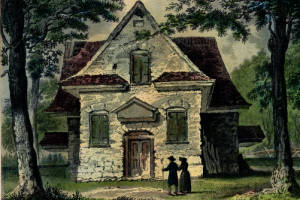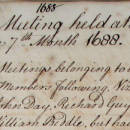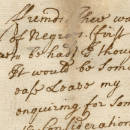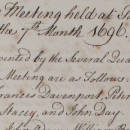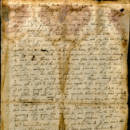
Early Protests
By Anne Moore Mueller
Drexel University, Class of 2008. Quakers & Slavery Digitization Project Intern
Germantown Protest, 1688
The first organized protest against slavery in the Americas was written in 1688 by four Pennsylvania Quakers from Germantown Meeting, a particular meeting under the care of Abington (often called Dublin) Monthly Meeting. Gerret Hendericks, Derick up de Graeff, Francis Daniell Pastorius, and Abraham up den Graef wrote this protest and presented their opposition to slavery and the trafficking of human beings at a Monthly Meeting at Dublin in Philadelphia.
In the document the Quakers use the Golden Rule to argue against such inhumane treatment of their fellow man regardless of the color of their skin, "we shall doe to all men licke as we will be done ourselves; macking no difference of what generation, descent or Colour they are." Seeing the injustices of the slave trade they courageously took a stand against slavery based on their religious and moral beliefs.
"Pray, what thing in the world can be done worse towards us, then if men should robb or steal us away, & sell us for slaves to strange Countries, separating housband from their wife and children. Being now this is not done at that manner we will be done at, therefore we contradict & are against this traffic of men body. And we who profess that it is unlawfull to steal, must lickewise avoid to purchase such things as are stollen, but rather help to stop this robbing and stealing if possibel." Connect to primary source and full transcript.
Dublin Monthly Meeting took this protest under consideration and sent it the Quarterly Meeting who also considered the matter and resolved "it being a thing of too great a weight for this meeting to determine." The four Germantown Friends were advised to present it to the Yearly Meeting. The Philadelphia Yearly Meeting at Burlington responds to the protest in their minute records, (Vol.A2, p.18) "It was adjudged not to be so proper for this meeting to give a positive judgment in the case, it having so general a relation to many other parts; and therefore at present they forbear it." More Friends began to speak out in opposition to slavery and the slave trade. 88 years after the initial Germantown Protest the Society of Friends officially denounced slavery.
This powerful document has twice been considered lost. The protest first reappeared in 1844 and was published in The Friend, XVII (1844), 125 by Nathan Kite. More recently it was rediscovered in 2005 at the Arch Street Meeting House. It is now at Haverford College Special Collections who along with Swarthmore's Friends Historical Library jointly hold the records of Philadelphia Yearly Meeting.
Merion Protest, 1696
Another early Quaker protest against slavery was written by Cadwalader Morgan from Merion, Pa. Morgan was a minister in the Society of Friends. He was born in Merioneth in Wales and emigrated to Merion, Pennsylvania. He married Jane Price and died in 1711. He was buried in Merion.
In this early document Morgan expresses his concerns surrounding purchasing a slave to free himself for other duties, such as going to Meeting. His anxieties lead him to conclude that it could bring more trouble than good.
"If I should have a bad one of them, that must be corrected, or would Run away, or when I went from home, & leave him with a woman or maid, and he should desire or seek to comitt wickedness, if such a thing happened that it would be more Loss and Trouble to me, than any outward gain could countervail." Connect to primary source and full transcript.
In answer to his concerns regarding purchasing a slave Morgan waits for the Lord to make it known to him how to proceed, he concludes that he "had no freedom to buy or take any of them upon any account." He reasons that worldly gain should not have a part in the enslaving of another human being.
Morgan's protest was brought to the Philadelphia Yearly Meeting and the Meeting advised "that Friends be careful not to encourage the bringing in of any more Negroes" (Minutes of the Philadelphia Yearly Meeting, September 23, 1696). This did not prohibit the importing of slaves but it discouraged Friends from participating in the slave trade. This was the first instance that the Philadelphia Yearly Meeting addressed the slave trade and took an antislavery stance on the issue.
References
Hendericks, Gerret; Graeff, Derick up de; Pastorius, Francis Daniell, 1651-1719; Graef, Abraham up den. Quaker Protest Against Slavery in the New World, Germantown (Pa.) 1688-4-18. Haverford College Special Collections, manuscript collection 990 B-R, 2 pages.
Morgan, Cadwalader. Quaker Protest Against Slavery, Merion (Pa.) 1696-07-05. Haverford College Special Collections, manuscript collection 990 B-R, 2 pages.
Philadelphia Yearly Meeting, Minutes, 1681-1746; Desc.: ; Affil.: Pre; Repos.: HV; Loc.: 1250/ A1.2

